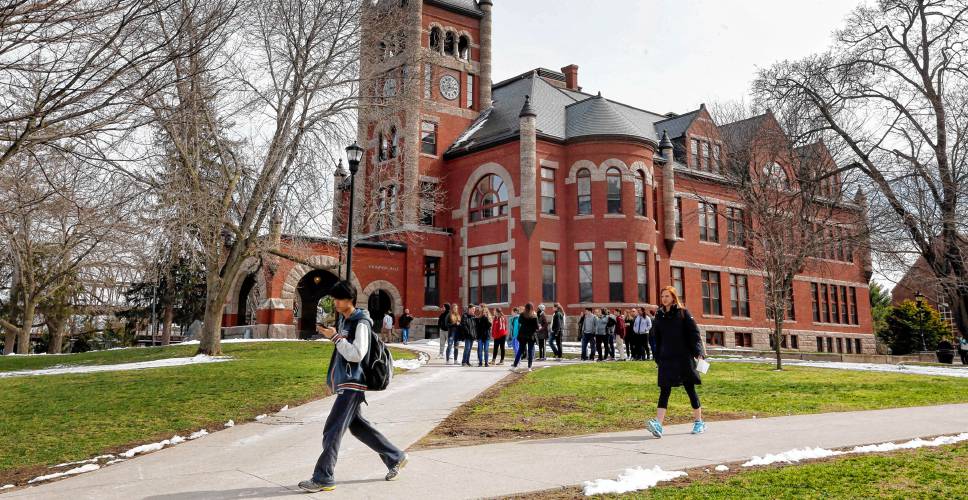UNH opts into House v. NCAA settlement, will pay athletes directly for 2025-26 school year

In this photo taken Wednesday April 6, 2016 students walk past the historic Thompson Hall at the University of New Hampshire in Durham, N.H. The water system serving the University is among more than two dozen in New Hampshire that have exceeded the federal lead standard at least once in the last three years. (AP Photo/Jim Cole) Jim Cole
| Published: 07-08-2025 6:00 PM |
The University of New Hampshire has opted into the House v. NCAA settlement, which will allow universities to pay their athletes directly, marking a new era for collegiate athletics as it moves further away from amateurism.
The class action lawsuit brought to light claims that the NCAA violated antitrust laws by illegally limiting the earning power of student-athletes. The settlement will end three different antitrust suits, but it will not settle all of the remaining questions regarding the employment status of NCAA athletes and limits on eligibility.
UNH and other universities that opt in will be allowed to disburse up to $20.5 million to their student-athletes for the 2025-26 school year, and the cap will increase 4% annually for the next 10 years. Student-athletes will be compensated in addition to the name, image and likeness (NIL) deals and scholarships they already receive.
Allison Rich, UNH’s athletic director, believes the university will retain its competitive success and that student-athletes will benefit from the increased transparency of NIL.
“We believe this new model offers exciting opportunities to strengthen support for our student-athletes by providing enhanced recruitment and retention capabilities and greater flexibility in scholarship and NIL activities. Opting in allows us to prioritize donor intent in funding such initiatives for our Wildcats,” Rich said in a press release.
Student-athletes have been allowed to receive compensation from sponsors and other third parties through NIL deals since 2021.
Third parties began organizing into collectives and endorsing the top Division 1 athletes soon after NIL deals were allowed. This largely unregulated landscape has allowed collectives to give millions of dollars that are used as recruiting incentives.
The settlement will give schools the power to limit these collectives’ influence by vetting NIH deals and auditing deals that exceed $600 to ensure they reflect fair market value and to limit their recruiting incentivization.
Article continues after...
Yesterday's Most Read Articles
 Concord City Council votes to buy rail corridor with a ‘heavy heart,’ threatening local rail bike business
Concord City Council votes to buy rail corridor with a ‘heavy heart,’ threatening local rail bike business
 Fire in Henniker engulfs saw mill, leaves no casualties
Fire in Henniker engulfs saw mill, leaves no casualties
 Warner town administrator denied permanent restraining order
Warner town administrator denied permanent restraining order
 ‘Ground zero’ to goal line: How one college coach built a football team from scratch
‘Ground zero’ to goal line: How one college coach built a football team from scratch
 Kearsarge Klassic gravel ride offers scenic escape and ‘exceptionally welcoming’ community
Kearsarge Klassic gravel ride offers scenic escape and ‘exceptionally welcoming’ community
Athletes who did not receive NIL compensation and competed between 2016 and 2024 will receive payments totaling $2.8 billion over the next 10 years from the NCAA.
According to Rich, UNH hopes to approach the new landscape with optimism and fiscal responsibility as it puts together a plan to disburse funds to its athletes. Donors and collectives will be able to give to the university and direct their funds toward its athletics initiatives.
“We are positioned to manage the financial implications of the settlement within our budget to minimize any negative effect to the larger university community,” Rich said. “We are excited for the future.”
Alexander Rapp can be reached at arapp@cmonitor.com.







 Youth organization visits Franklin to provide home repairs as ‘a free gift to the community’
Youth organization visits Franklin to provide home repairs as ‘a free gift to the community’ Update: Founder of neo-Nazi group spotted among masked protesters in Concord
Update: Founder of neo-Nazi group spotted among masked protesters in Concord Court docs: Concord spa under nearly decade-long scrutiny for suspected prostitution
Court docs: Concord spa under nearly decade-long scrutiny for suspected prostitution Allenstown weighs options for reintroducing trash pickup
Allenstown weighs options for reintroducing trash pickup
